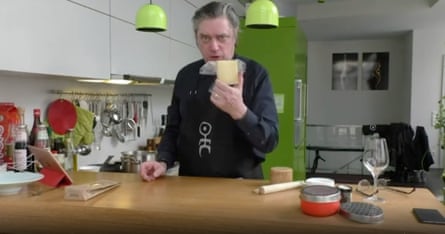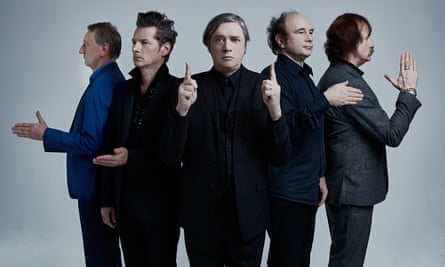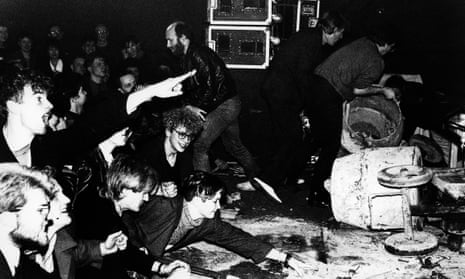‘The fire got a bit out of control,” says Blixa Bargeld, recalling a gig his band played in 1986. As Einstürzende Neubauten, which means Collapsing New Buildings, wrapped up their set of cacophonous industrial noise, Bargeld took a tray of lighter fluid and threw a match on it before squirting on more and watching the flames erupt. “Oh, it was gigantic,” he says with a wry smile. Panic and chaos ensued.
Today, thankfully, the only thing being toasted is a tablespoon of peppercorns Bargeld has instructed me to put in a pan as pasta bubbles away furiously. We are preparing spaghetti cacio e pepe. “My pasta is from Mancini,” he announces over Zoom, while opening a bottle of white wine. “He’s the only pasta-maker who grows his own wheat and has a doctorate.” Mine is from Co-op.
Bargeld has been regularly hosting these cooking sessions with fans via Patreon and Instagram. He picks a recipe, curates a playlist, drinks wine, dances, and people cook along. Wearing formal dinner attire rather than a chef’s outfit, Bargeld talks me through this simple yet punchy dish. “People think you just put cheese over the pasta but that won’t do,” he says. “You have to make a juice out of the peppercorns. Like a tea.”

Such activity is an extension of the community he has built among the German band’s fans. As an early adopter of crowdfunding, the group has been self-sufficient and patronage-funded since 2002. “It’s not an option for a band like us,” Bargeld says of the traditional record label model. “The money I currently get for making the album cover would be the amount I’d get for the whole record if I were to sign a record contract now.”
For 40 years, Bargeld has fronted Einstürzende Neubauten, an inimitable and pioneering outfit known for their blueprint influence on industrial music and their proclivity for utilising building tools and scrap metal, as well as inventing contraptions to be used as instruments.
Henry Rollins loves them so much he has the band’s logo as a tattoo. Trent Reznor cites them as a huge influence on Nine Inch Nails and later signed them to his label in the US. When Nick Cave stumbled across them, he fell in love and later wrote of Bargeld: “He stood in a black leotard, black rubber pants, black rubber boots. Around his neck hung a thoroughly fucked guitar. His skin cleared to his bones, his skull was an utter disaster, scabbed and hacked. Blixa Bargeld. He was the most beautiful man in the world.” Cave soon invited Bargeld to be the guitarist in Nick Cave and the Bad Seeds, where he remained for 20 years until 2003.
However, just as Bargeld’s aptitude for playing genial host belies his reputation as a man known to scream so intensely it can make dogs miles away howl, there’s also more to Neubauten than ear-terrorising industrial noise mania. This is displayed clearly on their latest album, Alles in Allem, their first studio record in 13 years.
“The attitude towards the music has relaxed,” says Bargeld. “Twenty years ago, I would have needed to fill spaces, thinking something was too boring or lacking. That’s youth. It’s a different attitude now. I don’t have that urge to fill every space or think there needs to be another scream.”
In tone, the result is still quintessentially Neubauten, a band that intuitively understands the equal power of restraint and exertion, albeit with noir pop, ambient soundscapes, sweeping strings and poignant melody overshadowing the cold, brittle rattle of industrial clatter. And why the long wait? “Art doesn’t come from when you can do something,” says Bargeld. “It comes from when you have to do something.”
Having formed in 1980, the band’s early output was a combination of avant-punk, noise, industrial and experimental. They rehearsed in a giant air-conditioning shaft situated underneath – technically inside – an autobahn overpass. The intensity of the sound ricocheted around the space whose steel walls doubled as drums, and set the band on a unique path.
Having something of an epiphany while listening to traditional Ethiopian music, Bargeld asked: “What is the authenticity of my life?” The answer lay around him in the debris of post-war Berlin coupled with its fertile and anything-goes outlook. “A lot has been said of West Berlin in the 1980s and all of it is true. It was like ground zero. The band is connected to this very special environment.” They sold their drum kit to pay rent and soon started to assemble their own instruments and creations, foraging in scrapyards or elsewhere. The message: “Be clever, steal from a construction site” was written across their first self-made drum set.
Fuelled by booze and speed, the band found their reputation would precede them. “The fire thing was moving faster than we were,” Bargeld says. “We’d turn up to gigs and they’d already be standing there with fire extinguishers. That was something we had to stop, as it became showbusiness. Just showing the audience a petrol canister filled with water became enough to terrify them.”
One gig – Concerto for Voice and Machinery at London’s ICA in 1984 – became so legendary it was later restaged as an artwork in 2007. But its myth has outgrown reality, Bargeld says. The story goes the band planned to drill through the floor into a rumoured secret passage that led to Buckingham Palace. Years later band member Alexander Hacke described the sound they made as “a cross between a building site and war”.
His role was to throw milk bottles into a cement mixer. As glass flew out into the crowd, smoke from the petrol chainsaws began to suffocate them, too. The power supply was pulled and a riot followed. “I didn’t want to take part in that show,” recalls Bargeld. The gig also featured members of Throbbing Gristle and Fad Gadget. “The damage was started by the audience, not the band. It was not planned.”

You don’t have to look too far for stories where myth and reality intertwine, however. The band did attempt to drill through a wall at the Berlin venue S036, and ex-member FM Einheit did have a penchant for throwing molotov cocktails into the audience, often causing riots. One night in Copenhagen, says Bargeld, “we were playing in a squat and we climbed up on the PA and began to chisel off parts of the ceiling. They viewed it as an attack on their house, so they slashed the tyres of our tour van, smashed the windows and stole equipment including our Kango drill.” They lasted just one night as tour support for U2 before being thrown off. The outraged and hostile audience threw bottles of urine. The band responded by throwing iron bars back at them.
This led many to think of the band as provocateurs but Bargeld disagrees. “I didn’t start out to destroy the stages of the world,” he says. “It was just a sign of being alive more than a provocation.” While still ferociously intense, shows are less wild these days. Sparks still fly, metal still scrapes and power tools still grind, as Bargeld glides between rich baritone croon and vocal cord-shredding scream, but there’s also melancholic beauty and tenderness. “We’re very serious about representing the material the best we can,” says Bargeld. “It’s not really about chaos – although I did fall off stage and break my leg not that long ago.”
One constant is the band’s innovative approach to equipment and recording. “There’s a strategy,” says Bargeld. “I want to undermine routine and sabotage logic. We’ve been doing that for 40 years with unusual instrumentation. It’s important to undermine functionality and knowledge – to disturb the obvious.”
For Bargeld, the sound of Tupperware filled with nails and coins being shaken recalls the sound of the ocean, while a microphone swiped across a shopping trolley mirrors the lush plucks of a harp. Nick Cave once wrote vividly about watching the band mic up a dog to root around in pig guts. “What I want when working with unusual materials is for them to open up and give something of their character away,” Bargeld says. “I don’t really care about sound. I think it’s highly overvalued. I care about context and metaphor.”
Watching Bargeld slurp up some pepper-coated spaghetti reminds me they have a percussive instrument called the noodle. However, foraging is getting harder these days apparently. “We went to a scrapyard,” says Bargeld. “But due to security reasons, they don’t let you in any more. They only let you look through the trash, and there’s not much treasure to be found in there.” Still, the band is still finding beautiful sounds in unexpected places. “Polystyrene,” says Bargeld, taking another mouthful, “gives you incredible sounds.”

Comments (…)
Sign in or create your Guardian account to join the discussion